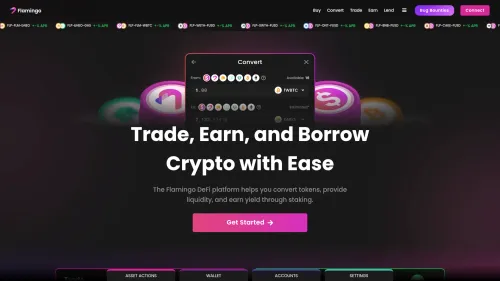Flamingo Finance (FLM)
Flamingo Finance (Symbol: FLM) is a decentralized finance (DeFi) protocol built on the NEO N3 blockchain. It is designed as a comprehensive platform that facilitates asset conversion, wrapping, liquidity provision, and staking for yield generation. The governance token, FLM, allows holders to participate in decision-making processes such as changing platform parameters and issuing new tokens. Flamingo Finance aims to enhance the Neo DeFi ecosystem and has achieved significant milestones, including reaching over $1.5 billion in total value locked shortly after its launch. The protocol combines features from various DeFi platforms, offering a diverse range of functionalities.
Features of Flamingo Finance
Protocol structure

| Ticker | FLM |
| Category | Decentralized Exchange (DEX) |
| Website | https://flamingo.finance/ |
| @FlamingoFinance | |
| Telegram | flamingo_finance |
| https://www.reddit.com/r/FlamingoDeFi/ | |
| Contract Addresses | |
|---|---|
| neo | |
Flamingo Finance consists of five core components: Wrapper (a cross-chain asset gateway), Swap (an on-chain liquidity provider), Vault (an asset manager), Perp (an AMM-based perpetual contract trading platform), and DAO. The FLM token is integral to the governance of Flamingo, and its distribution is entirely community-based, emphasizing participation. The project is supported by Neo Global Development, which plays a role in the early development stages, with an eventual transition to community governance through DAO.
How Flamingo Finance works
The protocol integrates multiple modules to create a robust DeFi infrastructure. Users can engage in various roles, such as traders, stakers, and liquidity providers, to leverage the platform's full capabilities.
Interoperability and fair launch
Interoperability
Flamingo Finance is built on the Neo blockchain and utilizes the Poly Network for interoperability, connecting to other blockchain networks like Ethereum, Ontology, and Cosmos-SDK-based blockchains. This design allows users to access a wider range of assets across blockchains.
Fair launch and FLM tokenomics
FLM tokens are distributed entirely based on user contribution, with no pre-mining or team reserves. The initial distribution is managed by the Flamingo team, transitioning to a DAO-based model for long-term distribution, where FLM holders can vote on proposals.
FLM distribution
FLM tokens are distributed to participants based on their activities, such as staking cross-chain assets, providing liquidity, minting FUSD, and participating in DAO governance.
Token release schedule
Early stage
Flamingo Finance has a pre-scheduled release of FLM over 13 weeks following its launch. The distribution is divided into various phases, with specific allocations for liquidity providers, FUSD minters, and Perp traders.
Long-term strategy
After the launch of DAO, the community will govern the FLM release schedule. The Flamingo team will propose a plan to ensure stable and sustainable operations, and community members participating in governance will receive a portion of the newly minted FLM.
Governance
Introduction to governance
Flamingo Finance encourages community participation in the Neo DeFi ecosystem through FLM governance tokens. FLM holders can engage in voting within the DAO, helping to shape the project's future.
Scope of governance
FLM holders are responsible for various governance aspects, including tokenomics, parameter configurations, and functionality improvements. Proposals for changes can be submitted by anyone in the community, with voting rights reserved for FLM holders.
Transitioning to DAO
The governance model will shift from a proof-of-authority system to a DAO, empowering the community to take over from the Flamingo team. An allocation of FLM will be provided to voters to foster a sustainable governance community.
Flamingo Swap and FLM rewards
Flamingo Finance introduced Flamingo Swap and staking rewards on October 5, 2020. A 0.3% fee for token swaps benefits liquidity providers, and users can set their preferences for slippage and trade timeouts.
Timeline for Flamingo Swap
- Mint Rush 2 staking rewards distribution completed on October 5, 2020.
- Liquidity provision and token swaps became available on October 5, 2020.
- Staking rewards for liquidity provider tokens commenced on October 5, 2020.
Trading pairs at launch
- FLM/nNEO
- pnWBTC/nNEO
- pnWETH/nNEO
- pONT/nNEO
- nNEO/pnUSDT
- pnWBTC/pnUSDT
Staking rewards
Initial FLM distribution
Following the completion of Mint Rush 2, FLM distribution shifted to staking LP tokens from various trading pairs in the Vault. The release rate follows a predefined schedule, with specific allocations for different trading pairs.
Roadmap
Q1 2022
- Streaming sessions
- Stake FLM to earn FLM
- Adjust FLM distribution
- Reverse pools
- Mobile wallet
- Roadmap for 2022
Q2 2022
- Advanced trading
- On-ramp services
- Claim and trade history
- Streaming sessions
- On-chain order book
- Adjust FLM distribution
Q3 2022
- FUSD: A stablecoin backed by FLUND tokens
- New cross-chain bridge
- Streaming sessions
- Adjust FLM distribution
- Updated tokenomics
- Token auction offering
Q4 2022
- Flamingo Lending
- Flamingo Pay
- Flamingo JavaScript library
- Adjust FLM distribution
